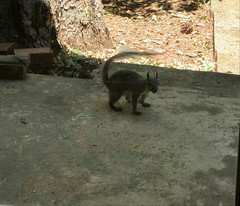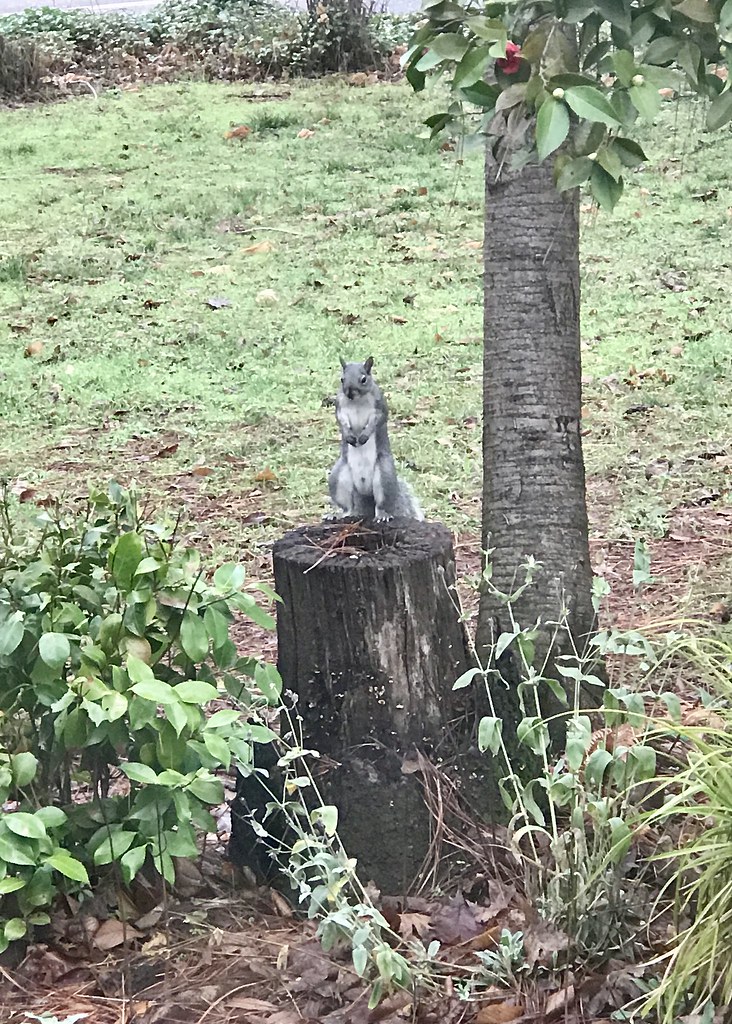Skimpy is a squirrel with distinction and it isn’t just her tail, which has filled in since she first appeared at my home. Nor is it her characteristic sprawl as I’ve known other sprawling squirrels. I’m fairly sure the oddball squirrel whose antics charm me and the parrots is one person — not a series of indistinguishable scamps. I recognize Skimpy by her style and personality now that the tail trait is less obvious. If I open the parrots’ bedroom drapes in the morning and see a squirrel flopped belly down atop the forked lower stem of a shrub as if lounging under a beach umbrella, it’s Skimpy. No one else stretches out and hangs her head off a 2x4 board mysteriously nailed twenty feet up a pine tree trunk, like a diving board. I look at her and think “what a character” and she looks at me and thinks . . . . something, perhaps “what a character.” We both think but from different perspectives (probably).

The Daily Bucket is a nature refuge. We amicably discuss animals, weather, climate, soil, plants, waters and note life’s patterns spinning around us.
We invite you to note what you are seeing around you in your own part of the world, and to share your observations in the comments below.
|

Yesterday morning I was reading, sitting in a chair facing the glass front door. The seed feeder hangs outside the door, and I enjoy seeing bird visitors. Chispa (parrot) was playing inside, on the floor near the door. When I heard Chispa say “hola, hello,” I looked at him wondering why he was speaking. He doesn’t say that just to make noise — he says “hola” in context. He adds the “hello” when he’s being particularly courteous. He learned “hello” from a announcer for a Nickelodeon game show and when he wants to be most charmingly formal says suavely, “hola . . . hello everybody . . . I’m Besame.” (And yet at all other times, he responds to his name, Chispa. I don’t know why he claims my name only for this phrase. Ultimate Power/Authority?)
This time, he was saying “hola” to Skimpy. She stood facing the glass door with her front legs raised and her “hands” flat on the glass. Flattened upright against the door, she peered into the house at Chispa and gazed around the room. As I looked at her, she looked back at me. Chispa turned his head from Skimpy to me and back again. The three of us swiveled our heads and stared into each others eyes silently for a couple of minutes. Then Chispa moved and Skimpy dropped down and ran off.
I had been reading Other Minds: the Octopus, the Sea, and the Deep Origins of Consciousness by Peter Godfrey Smith and our interaction reminded me of the author’s description of meeting a spectacular giant cuttlefish.
I swam down repeatedly, holding my breath, to watch this animal. Soon I was exhausted, but I was also reluctant to stop, as the creature seemed as interested in me as I was in it (in him? in her?). This was my first experience with an aspect of these animals that has never stopped intriguing me: the sense of mutual engagement one can have with them.
Cognitively, what is required for mutual engagement? I have this often with Chispa and the other two parrots. I know Chispa has cognition and self-awareness. Why shouldn’t a squirrel? Sure, she’s no neuron-rich cuttlefish, but neither is she an organic instinctive robot.
Smith says “there’s a particular style of processing—one that we use to deal especially with time, sequences, and novelty—that brings with it conscious awareness, while a lot of other quite complex activities do not.” Squirrels harvest and cache pine cones for winter amidst cones cached by other squirrels, and remember where they buried their cones: time, sequences, novelty.
Although squirrels buried nuts in areas where other squirrels had also buried nuts, they retrieved significantly more nuts from their own cache sites than from the cache sites of other squirrels, even after delays of 4 or l2 days. This retrieval accuracy could not be explained by the squirrels' habitual use of the same areas: the ratio of own caches to other caches retrieved was greater than expected based on the availability of caches in the area searched during retrieval. A squirrel was also more likely to retrieve its own cache even when another squirrel's cache was closer to it….
Skimpy’s conscious awareness of Chispa and me probably arises from curiosity (she also may be mapping out my internet cable to chew on). Her confidence in being near us is because we are safely separate yet visible (the glass door). The sunflower seeds wild birds drop from the feeder focus Skimpy on my front door. She knows that seeds flow where the birds go. I wonder, though, if Chispa were the first bird to speak directly to her, to mutually engage. Do squirrels, like humans, assume they’re the only ones with consciousness?
Smith reminds us about the opinion of William James, 19th century philosopher and a founder of psychology, who argued that we shouldn’t assume that consciousness sprang fully formed into the universe just in humans, that we should consider it having precursors. In the epigraph to Other Minds, Smith quoted what James wrote in The Principles of Psychology (1890).
The demand for continuity has, over large tracts of science, proved itself to possess true prophetic power. We ought therefore ourselves sincerely to try every possible mode of conceiving the dawn of consciousness so that it may not appear equivalent to the irruption into the universe of a new nature, non-existent until then.
In other words, not only humans have consciousness. It isn’t likely consciousness burst into existence solely in our species. That moment of mutual engagement among Skimpy, Chispa, and me was only special because we were three species mutually engaging, and because the bird spoke two human languages.
I’ll let Skimpy end this story from her podium beneath the camellia outside our front window.
 “Therefore, don’t assume you humans are the special ones. We squirrels also think and are conscious. I admit, though, that I’m now forced to reconsider my assumptions about birds.”
“Therefore, don’t assume you humans are the special ones. We squirrels also think and are conscious. I admit, though, that I’m now forced to reconsider my assumptions about birds.”

SPOTLIGHT ON GREEN NEWS & VIEWS POSTS EVERY SATURDAY AND WEDNESDAY AFTERNOONS (PACIFIC TIME) ON THE DAILY KOS FRONT PAGE.
BE SURE TO LOOK FOR THE STORIES YOU MISSED.
RECOMMEND AND COMMENT to THANK METEOR BLADES FOR HIS DEDICATED CURATION.
|
Who’s mutually engaging with you? Do you know any tree gossip?


